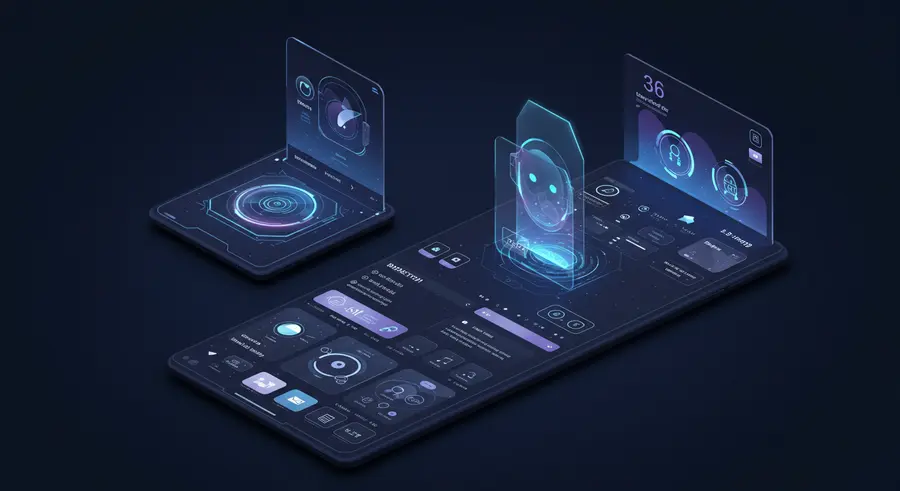Appearance

Welcome, fellow innovators! 👋 Today, we're peering into the crystal ball of web development to explore a truly exciting synergy: the integration of Progressive Web Apps (PWAs) with Artificial Intelligence (AI). This isn't just a trend; it's a powerful evolution that promises to redefine how users interact with web applications, making them smarter, more intuitive, and incredibly engaging.
What are PWAs, Again? A Quick Refresher 💡
Before we dive into the AI realm, let's briefly revisit what makes PWAs so revolutionary. If you want a more in-depth understanding, check out our existing article: The Power of Progressive Web Apps (PWAs).
In a nutshell, PWAs are web applications that leverage modern web capabilities to deliver an app-like experience to users. They combine the best of both worlds: the accessibility of the web with the rich features of native applications. Key characteristics include:
- Reliable: They load instantly and reliably, even in uncertain network conditions, thanks to Service Workers.
- Fast: Optimized for speed, providing a smooth and responsive user experience.
- Engaging: They can be installed on the home screen, receive push notifications, and access device hardware, blurring the line between web and native.
The AI Infusion: Supercharging PWAs with Intelligence 🧠
Now, imagine coupling these robust capabilities with the intelligence of AI. The possibilities are truly boundless! AI can transform PWAs from static, albeit fast and reliable, applications into dynamic, personalized, and predictive experiences. Here’s how:
1. Personalized User Experiences 🎯
AI algorithms can analyze user behavior, preferences, and historical data to tailor content, recommendations, and even UI elements within a PWA.
- E-commerce: A PWA for an online store could use AI to recommend products based on past purchases, browsing history, and even real-time interactions, creating a highly personalized shopping journey. Think of intelligent product suggestions that anticipate your needs!
- Content Platforms: News or blog PWAs can leverage AI to curate articles and topics most relevant to an individual user, ensuring they always see content they're likely to find engaging.
2. Enhanced Search and Discovery 🔎
Beyond traditional keyword search, AI can enable more intelligent and contextual search within PWAs.
- Voice Search: Integrating AI-powered natural language processing (NLP) allows users to interact with PWAs using voice commands, making navigation and content discovery effortless. "Hey PWA, find me Italian restaurants near me!"
- Visual Search: Imagine using your camera within a PWA to identify an object and find similar items for purchase, or retrieve information about it.
3. Predictive Analytics and Proactive Assistance 🔮
AI can empower PWAs to anticipate user needs and offer proactive assistance, leading to a truly seamless experience.
- Travel Apps: A PWA for travel could use AI to predict flight delays, suggest alternative routes, or even recommend nearby attractions based on your itinerary and real-time conditions. It could proactively send push notifications with relevant updates.
- Health & Fitness: A fitness PWA could analyze your workout patterns and health data to suggest personalized exercise routines or dietary advice, acting as a smart personal coach.
4. Intelligent Automation and Chatbots 🤖
AI-powered chatbots and virtual assistants embedded within PWAs can provide instant support, answer queries, and automate tasks, improving customer service and user engagement.
- Customer Support: Instead of navigating complex menus, users can simply ask a chatbot within the PWA for help with an order, a refund, or technical support.
- Booking Systems: Automating booking processes, sending reminders, and managing appointments can be handled efficiently by an AI assistant in a PWA.
5. Offline Capabilities with Smarter Data Sync 🌐
While PWAs already excel at offline functionality, AI can enhance this by intelligently prioritizing data synchronization and optimizing resource usage.
- Field Service Apps: A PWA for field technicians could use AI to determine critical data to sync first when connectivity is restored, ensuring essential information is always up-to-date.
- Learning Platforms: An educational PWA could intelligently download course materials based on a student's progress and upcoming lessons, optimizing offline learning.
The Future is Now: Examples and Impact ✨
Many companies are already experimenting with AI in their PWAs, leading to impressive results. The blend of PWA's reach and AI's intelligence creates a formidable combination for businesses aiming to deliver exceptional user experiences and drive engagement.
The future of web experiences is undoubtedly intelligent, personalized, and seamless. PWAs, armed with the power of AI, are at the forefront of this transformation, promising a new era of dynamic and responsive web applications that truly understand and anticipate user needs.
So, are you ready to embrace the intelligent web? Let's build the future, one smart PWA at a time! 🚀